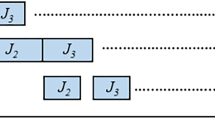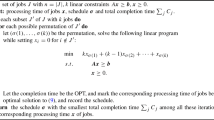Abstract
Due to the ubiquity of batch data processing, the related problems of scheduling malleable batch tasks have received significant attention. We consider a fundamental model where a set of tasks is to be processed on multiple identical machines and each task is specified by a value, a workload, a deadline and a parallelism bound. Within the parallelism bound, the number of machines assigned to a task can vary over time without affecting its workload. In this paper, we identify a boundary condition and prove by construction that a set of malleable tasks with deadlines can be finished by their deadlines if and only if it satisfies the boundary condition. This core result plays a key role in the design and analysis of scheduling algorithms: (i) when several typical objectives are considered, such as social welfare maximization, machine minimization, and minimizing the maximum weighted completion time, and, (ii) when the algorithmic design techniques such as greedy and dynamic programming are applied to the social welfare maximization problem. As a result, we give four new or improved algorithms for the above problems.















Similar content being viewed by others
Data Availability
Data sharing not applicable to this article as no datasets were generated or analyzed during the current study.
References
Wu X, Loiseau P (2015) Algorithms for scheduling deadline-sensitive malleable tasks. In: Proceedings of the 53rd Annual Allerton Conference on Communication, Control, and Computing (Allerton). IEEE, pp 530–537
Jain N, Menache I, Naor J, Yaniv J (2011) A truthful mechanism for value-based scheduling in cloud computing. Proceedings of the 4th International Conference on Algorithmic Game Theory. SAGT’11. Springer-Verlag, Berlin, Heidelberg, pp 178–189. https://dl.acm.org/doi/abs/10.5555/2050805.2050827
Jain N, Menache I, Naor J, Yaniv J (2012) Near-optimal scheduling mechanisms for deadline-sensitive jobs in large computing clusters. In: Proceedings of the Twenty-fourth Annual ACM Symposium on Parallelism in Algorithms and Architectures. ACM, pp 255–266
Nagarajan V, Wolf J, Balmin A, Hildrum K (2019) Malleable scheduling for flows of jobs and applications to MapReduce. J Sched 22(4):393–411
Wu X, Loiseau P, Hyytiä E (2019) Towards designing cost-optimal policies to utilize IaaS Clouds with Online Learning. IEEE Trans Parallel Distrib Syst
Fox GC (2011) Data intensive applications on clouds. In: Proceedings of the Second International Workshop on Data Intensive Computing in the Clouds. ACM, pp 1–2
Gunarathne T, Wu T-L, Qiu J, Fox G (2010) Cloud computing paradigms for pleasingly parallel biomedical applications. In: Proceedings of the 19th ACM International Symposium on High Performance Distributed Computing (HPDC’10). ACM, pp 460–469
Lawler Eugene L (1990) A dynamic programming algorithm for preemptive scheduling of a single machine to minimize the number of late jobs. Ann Oper Res 26(1):125–133
Karger D, Stein C, Wein J (1997) Scheduling algorithms. In: CRC Handbook of Computer Science
Jackson JR (1955) Scheduling a production line to minimize maximum tardiness. Management Science Research Project Research Report 43, University of California, Los Angeles
Horn WA (1974) Some simple scheduling algorithms. Nav Res Logist Q 21:177–185
Lawler EL, Moore JM (1969) A Functional equation and its application to resource allocation and sequencing problems. Manage Sci 16(1):77–84
Stankovic JA, Spuri M, Ramamritham K, Buttazzo G (1998) Deadline scheduling for real-time systems: EDF and related algorithms. Springer New York, NY. https://link.springer.com/book/10.1007/978-1-4615-5535-3
Lucier B, Menache I, Naor J, Yaniv J (2013) Efficient online scheduling for deadline-sensitive jobs. In: Proceedings of the Twenty-fifth Annual ACM Symposium on Parallelism in Algorithms and Architectures. ACM, pp 305–314
Azar Y, Kalp-Shaltiel I, Lucier B, Menache I, Naor J, Yaniv J (2015) Truthful online scheduling with commitments. In: Proceedings of the Sixteenth ACM Conference on Economics and Computation. ACM, pp 715–732
Sudipto Guha J, Khanna S, Naor J (2004) Machine minimization for scheduling jobs with interval constraints. In: Proceedings of the 45th Annual IEEE Symposium on Foundations of Computer Science. IEEE, pp 81–90
Brassard G, Bratley P (1996) Fundamentals of algorithmics. Prentice-Hall, Inc
Bodík P, Menache I, Naor J, Yaniv J (2014) Brief announcement: deadline-aware scheduling of big-data processing jobs. In: Proceedings of the 26th ACM Symposium on Parallelism in Algorithms and Architectures. ACM, pp 211–213
Williamson DP, Shmoys DB (2011) The design of approximation algorithm. Cambridge University Press
Guo L, Shen H (2017) Efficient approximation algorithms for the bounded flexible scheduling problem in clouds. IEEE Trans Parallel Distrib Syst 28(12):3511–3520
Dutot P-F, Mounié G, Trystram D (2004) Scheduling parallel tasks: approximation algorithms. In: Leung JY-T (ed) Handbook of Scheduling: Algorithms, Models, and Performance Analysis. CRC Press, Boca Raton
Jansen K, Rau M (2019) Closing the gap for pseudo-polynomial strip packing. In: Proceedings of the 27th Annual European Symposium on Algorithms (ESA’19). Schloss Dagstuhl - Leibniz-Zentrum für Informatik, p 62:1-62:14
Jansen K, Rau M (2019) Improved approximation for two dimensional strip packing with polynomial bounded width. Theor Comput Sci
Bougeret M, Dutot P-F, Jansen K, Robenek C, Trystram D (2011) Approximation algorithms for multiple strip packing and scheduling parallel jobs in platforms. Discrete Math Algorithms Appl 3(04):553–586
Jansen K, Land F (2018) Scheduling monotone moldable jobs in linear time. 2018 IEEE International Parallel and Distributed Processing Symposium (IPDPS). IEEE, pp 172–181. https://doi.org/10.1109/IPDPS.2018.00027, https://ieeexplore.ieee.org/document/8425171
Bleuse R, Hunold S, Kedad-Sidhoum S, Monna F, Mounié G, Trystram D (2017) Scheduling independent moldable tasks on multi-cores with GPUs. IEEE Trans Parallel Distrib Syst 28(9):2689–2702
Wu X, Loiseau P (2016) Efficient algorithms for scheduling moldable tasks. Preprint at http://arxiv.org/abs/1609.08588v8
Wu X, Loiseau P (2023) Efficient approximation algorithms for scheduling moldable tasks. Eur J Oper Res 310(1):71–83
Mounié G, Rapine C, Trystram D (2007) A \(\frac{3}{2}\)-approximation algorithm for scheduling independent monotonic malleable tasks. SIAM J Comput 37(2):401–412
Dutot P-F, Trystram D (2001) Scheduling on hierarchical clusters using malleable tasks. In: Proceedings of the Thirteenth annual ACM Symposium on Parallel Algorithms and Architectures. ACM, pp 199–208
Lepère R, Trystram D, Woeginger GJ (2002) Approximation algorithms for scheduling malleable tasks under precedence constraints. Int J Found Comput Sci 13(04):613–627
Jansen K, Porkolab L (2002) Linear-time approximation schemes for scheduling malleable parallel tasks. Algorithmica 32(3):507–520
Ludwig W, Tiwari P (1994) Scheduling malleable and nonmalleable parallel tasks. In: Proceedings of the Fifth Annual ACM-SIAM Symposium on Discrete Algorithms. SIAM, pp 167–179
White T (2012) Hadoop: the definitive guide. O’Reilly Media, Inc
Even G (2007) Recursive greedy methods. In: Gonzalez TF (ed) Handbook of Approximation Algorithms and Metaheuristics. CRC, Boca Raton, FL, ch. 5
Funding
The work of Patrick Loiseau has been partially supported by MIAI @ Grenoble Alpes (ANR-19- P3IA-0003), by the French National Research Agency (ANR) through grant ANR-20-CE23-0007 and through the “Investissements d’avenir” program (ANR-15-IDEX- 02); and by the Alexander von Humboldt Foundation.
Author information
Authors and Affiliations
Corresponding author
Ethics declarations
Conflict of Interest
The authors declare no competing interests.
Additional information
Publisher's Note
Springer Nature remains neutral with regard to jurisdictional claims in published maps and institutional affiliations.
This paper is an extended version of [1]
Rights and permissions
Springer Nature or its licensor (e.g. a society or other partner) holds exclusive rights to this article under a publishing agreement with the author(s) or other rightsholder(s); author self-archiving of the accepted manuscript version of this article is solely governed by the terms of such publishing agreement and applicable law.
About this article
Cite this article
Wu, X., Loiseau, P. Algorithms for Scheduling Deadline-Sensitive Malleable Tasks. Oper. Res. Forum 5, 30 (2024). https://doi.org/10.1007/s43069-024-00300-4
Received:
Accepted:
Published:
DOI: https://doi.org/10.1007/s43069-024-00300-4




